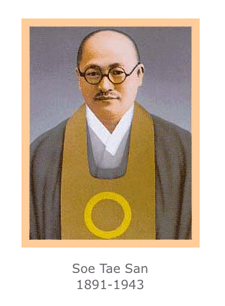Wŏn Buddhism, Wŏnbulgyo, a compound of the Korean wŏn (circle) and pulgyo (Buddhism), means literally “Round Buddhism,” or “Consummate Buddhism.” It is the name of an indigenous religion founded in Korea in the twentieth century.
History
 According to Won Buddhist sources, Pak Chungbin (1891–1943; Sot’aesan) attained great enlightenment in 1916 and had a precognition of the world entering an era of advancing material civilization, to which humans would be enslaved. The only way to save the world was by expanding spiritual power through faith in genuine religion and training in sound morality.
According to Won Buddhist sources, Pak Chungbin (1891–1943; Sot’aesan) attained great enlightenment in 1916 and had a precognition of the world entering an era of advancing material civilization, to which humans would be enslaved. The only way to save the world was by expanding spiritual power through faith in genuine religion and training in sound morality.
With the dual aims to save sentient beings and cure the world of moral ills, Sot’aesan began his religious mission. He opened a new religious order with the buddhadharma as the central doctrine, establishing the Society of the Study of the Buddha-dharma at Iksan, North Cholla province, in 1924. He edified his followers with newly drafted doctrine until his death in 1943. The central doctrine was published in the Pulgyo chŏngjŏn (The Correct Canon of Buddhism) in 1943.
In 1947 Song Kyu (1900–1962; “Chŏngsan”), the second patriarch, renamed the order Wŏnbulgyo (Wŏn Buddhism) and published the new canon, Wŏnbulgyo kyojŏn (The Scriptures of Won Buddhism), in 1962.
Doctrine and Practice

The central doctrine lies in the tenets of Irwŏnsang (unitary circular form), Four Beneficences [Graces], and Threefold Practice:
– Just like a finger pointing at the moon, Irwŏnsang, enshrined as the symbol of the dharmakaya of the Buddha, refers to the Buddha-nature of the Tathāgatha and the fundamental source of the four beneficences (heaven and earth, parents, fellow beings, and laws) to which one owes one’s life. Irwŏn (unitary circle), the Wŏnbulgyo name for the Dharmakāya Buddha, is the noumenal nature of all beings of the universe, the original nature of all buddhas and patriarchs, and the Buddha-nature of all sentient beings. The worship of Irwŏn lies in requiting the four beneficences, as stated in the motto: “Requiting beneficence is making offerings to Buddha.” The practice of Irwon lies in wisdom (prajñā), fostering concentration (samādhi) and using virtue (śīla), upon enlightenment to the Buddha-nature in mundane, daily life.
– The requital of the four beneficences is carried out:
2. for parents, protecting the helpless;
3. for fellow beings, benefiting oneself by benefiting others; and
4. for laws, doing justice and forsaking injustice.
– The threefold practice is perfected by:
prajňā, inquiry into facts and principles; and
śīla, the heedful choice in karmic action.
The threefold practice is carried out through Zen, which holds as its central principle that when the six sense organs are at rest, one should nourish the One Mind by clearing the mind of worldly thoughts; when they are at work, one should forsake injustice and cultivate justice.
Goals of Won Buddhist Mission
The Won Buddhist order is bringing beneficence to the human race by way of mission, education, and charity, which are its three major tasks. Mission is accomplished mainly at the Won Buddhist temples. It goal to deliver Won Buddhist teachings to people who have are seeking a more enlightened way. It also purposes to help people to discover the Buddha nature within themselves – which is equal to the nirvana of Buddhas – and to become free from karmic bondage augmented by regular services, training sessions, rituals,counseling, and other support in the temples.
Won Buddhist educational task seeks to dispel the negative effects of karma and realizes ignorance, and to manifest brightness and the emancipation that comes with knowledge. These goals are fulfilled in the educational institutions affiliated with the Won Buddhist order. At the same time, Won Buddhism’s goal for education is the goal of education in general, which purposes to promote human spirituality and world civilization for a better world. Charitable work aims to protect disadvantaged people in the realms of spiritual, physical, or material conditions, and to help them to cultivate independence. It also aims to build a society based on the ideals of perfection and equality.
For these goals, the Won Buddhist order has established many charitable institutions and welfare facilities for homeless people, orphans, disabled people, aged people, sick people, and various neglected people in the society.
Soe Tae San taught that human beings become enslaved to materialism and degenerate due to the influence of advanced science and technology. The United Religions Movement” purposes to free the individual from one’s own religious egotism and boundaries, and to fulfill the original mission of religion.
In furtherance of the goal of religious cooperation, the Won Buddhist community proposes to establish an institutionalized organization for world religions comparable to, and on parallel with, the United Nations organization. The Won Buddhist community aims to take the lead in removing the boundaries and barriers of the past, and creating one global family on earth, in tandem with other religious communities
Source : Wikipedia





Comments are closed.